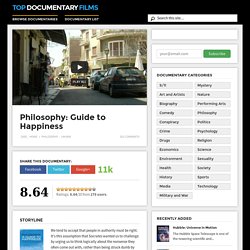

Tetrapharmakos. The Tetrapharmakos (τετραφάρμακος) "four-part remedy" is a summary of the first four of the Κύριαι Δόξαι (Kuriai Doxai, the forty Epicurean Principal Doctrines given by Diogenes Laërtius in his Life of Epicurus) in Epicureanism, a recipe for leading the happiest possible life.

They are recommendations to avoid anxiety or existential dread.[1] The four-part cure[edit] As expressed by Philodemos, and preserved in a Herculaneum Papyrus (1005, 4.9–14), the tetrapharmakos reads:[4] This is a summary of the first four of the forty Epicurean Principal Doctrines (Sovran Maxims) given by Diogenes Laërtius, which in the translation by Robert Drew Hicks (1925) read as follows: 1. 2. 3. 4. Don't fear god[edit] In Hellenistic religion, the gods were conceived as hypothetical beings in a perpetual state of bliss, indestructible entities that are completely invulnerable.
Man's Search for Meaning. According to a survey conducted by the Book-of-the-Month Club and the Library of Congress, Man's Search For Meaning belongs to a list of "the ten most influential books in the United States.

"[1] At the time of the author's death in 1997, the book had sold over 10 million copies and had been translated into 24 languages.[2][3] Editions[edit] The book's title in the German language was ...trotzdem Ja zum Leben sagen: Ein Psychologe erlebt das Konzentrationslager, and the title of the first English language translation was From Death-Camp to Existentialism. The book's common full English title is Man's Search for Meaning: An Introduction to Logotherapy, although this subtitle is often not referred to on modern book covers.[4] Eudaimonia. Discussion of the links between virtue of character (ethikē aretē) and happiness (eudaimonia) is one of the central concerns of ancient ethics, and a subject of much disagreement.

As a result there are many varieties of eudaimonism. Two of the most influential forms are those of Aristotle[3] and the Stoics. Aristotle takes virtue and its exercise to be the most important constituent in eudaimonia but acknowledges also the importance of external goods such as health, wealth, and beauty. By contrast, the Stoics make virtue necessary and sufficient for eudaimonia and thus deny the necessity of external goods.[4] Definition[edit] The good composed of all goods; an ability which suffices for living well; perfection in respect of virtue; resources sufficient for a living creature.
So, as Aristotle points out, saying that eudaimon life is a life which is objectively desirable, and means living well, is not saying very much. Main views on eudaimonia and its relation to aretē[edit] Philosophy: Guide to Happiness. We tend to accept that people in authority must be right.

It's this assumption that Socrates wanted us to challenge by urging us to think logically about the nonsense they often come out with, rather than being struck dumb by their aura of importance and air of suave certainty. This six part series on philosophy is presented by popular British philosopher Alain de Botton, featuring six thinkers who have influenced history, and their ideas about the pursuit of the happy life. Socrates on Self-Confidence (Part 1) - Why do so many people go along with the crowd and fail to stand up for what they truly believe? Partly because they are too easily swayed by other people's opinions and partly because they don't know when to have confidence in their own. Free Philosophy Video Lecture-Philosophy- Lecture 1. Code of Conduct. The problem of evil, as described circa 300 B.C. In about 300 B.C., Epicurus eloquently summed up the problem of the existence of evil.

It has come to be known as the Riddle of Epicurus or the Epicurean paradox. It was translated by David Hume in the Dialogues concerning Natural Religion: If God is willing to prevent evil, but is not able to Then He is not omnipotent.If He is able, but not willing Then He is malevolent.If He is both able and willing Then whence cometh evil? If He is neither able nor willing Then why call Him God? Tags: Epicurus, problem of evil Category: Good and Evil, Quotes About the Author (Author Profile) Erich Vieth is an attorney focusing on consumer law litigation and appellate practice. 10 Golden Lessons from Albert Einstein. Every day I remind myself that my inner and outer life are based on the labors of other men, living and dead, and that I must exert myself in order to give in the same measure as I have received and am still receiving - Albert Einstein Albert Einstein was an amazing physicist.

He figured out so many universal principles and equations that he was way ahead of his fellow scientists at any point of time. But he is also remembered for another thing; a quality which made people call him a genius: his words. Prof. Einstein was a philosopher who clearly understood the laws of success and explained them like the way he did with his equations. 1. Most people don’t try new things because of their fear of failure. 2. 30 years from now, you won’t possibly remember what chapters you had in your science book; you’d only remember what you learn on your way. 3. 4.
Creativity and uniqueness often depends on how well you hide your sources. 5.